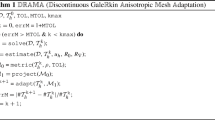Abstract
We present a new technology for generating meshes minimizing the interpolation and discretization errors or their gradients. The key element of this methodology is construction of a space metric from edge-based error estimates. For a mesh with N h triangles, the error is proportional to \(N_h^{-1}\) and the gradient of error is proportional to \(N_h^{-1/2}\) which are the optimal asymptotics. The methodology is verified with numerical experiments.
Access this chapter
Tax calculation will be finalised at checkout
Purchases are for personal use only
Preview
Unable to display preview. Download preview PDF.
Similar content being viewed by others
References
Agouzal, A., Vassilevski, Y.: Minimization of gradient errors of piecewise linear interpolation on simplicial meshes. Submitted to SIAM J. Numer. Anal. (2008)
Agouzal, A., Lipnikov, K., Vassilevski, Y.: Adaptive generation of quasi-optimal tetrahedral meshes. East-West J. Numer. Math. 7, 223–244 (1999)
Agouzal, A., Lipnikov, K., Vassilevski, Y.: Generation of quasi-optimal meshes based on a posteriori error estimates. In: Brewer, M., Marcum, D. (eds.) Proceedings of 16th International Meshing Roundtable, pp. 139–148. Springer, Heidelberg (2007)
Agouzal, A., Lipnikov, K., Vassilevski, Y.: Hessian-free metric-based mesh adaptation via geometry of interpolation error. Comp. Math. Math. Phys. 49(11) (to appear, 2009)
Ait-Ali-Yahia, D., Habashi, W.G., Tam, A., Vallet, M.-G., Fortin, M.: Directionally adaptive methodology using an edge-based error estimate on quadrilateral grids. Inter. J. Numer. Meth. Fluids 23(7), 673–690 (1996)
Bono, G., Awruch, A.M.: An adaptive mesh strategy for high compressible flows based on nodal re-allocation. J. Brazilian Soc. Mech. Sci. Engr. 30(3), 189–196 (2008)
Buscaglia, G.C., Dari, E.A.: Anisotropic mesh optimization and its application in adaptivity. Inter. J. Numer. Meth. Engrg. 40, 4119–4136 (1997)
Chen, L., Sun, P., Xu, J.: Optimal anisotropic meshes for minimizing interpolation errors in Lp-norm. Mathematics of Computation 76, 179–204 (2007)
Ciarlet, P., Wagschal, C.: Multipoint Taylor formulas and applications to the finite element method. Numer. Math. 17, 84–100 (1971)
Ciarlet, P.: The finite element method for elliptic problems. North-Holland, Amsterdam (1978)
D’Azevedo, E.: Optimal triangular mesh generation by coordinate transformation. SIAM J. Sci. Stat. Comput. 12, 755–786 (1991)
Deuflhard, P., Leinen, P., Yserentant, H.: Concepts of an adaptive hierarchical finite element code. IMPACT 1, 3–35 (1989)
Frey, P.J., Alauzet, F.: Anisotropic mesh adaptation for CFD computations. Comput. Meth. Appl. Mech. Eng. 194, 5068–5082 (2005)
Huang, W.: Metric tensors for anisotropic mesh generation. J. Comp. Physics. 204, 633–665 (2005)
Lipnikov, K., Vassilevski, Y.: Parallel adaptive solution of 3D boundary value problems by Hessian recovery. Comput. Meth. Appl. Mech. Eng. 192, 1495–1513 (2003)
Tichomirov, V.M.: The widths of sets in functional spaces and theory of optimal approximations. Uspehi Matem. Nauk 15(3), 81–120 (1960)
Vassilevski, Y., Lipnikov, K.: Adaptive algorithm for generation of quasi-optimal meshes. Comp. Math. Math. Phys. 39, 1532–1551 (1999)
Vassilevski, Y., Agouzal, A.: An unified asymptotic analysis of interpolation errors for optimal meshes. Doklady Mathematics 72, 879–882 (2005)
Zhu, J.Z., Zienkiewicz, O.C.: Superconvergence recovery technique and a posteriori error estimators. Inter. J. Numer. Meth. Engrg. 30, 1321–1339 (1990)
Author information
Authors and Affiliations
Editor information
Editors and Affiliations
Rights and permissions
Copyright information
© 2009 Springer-Verlag Berlin Heidelberg
About this paper
Cite this paper
Agouzal, A., Lipnikov, K., Vassilevski, Y. (2009). Anisotropic Mesh Adaptation for Solution of Finite Element Problems Using Hierarchical Edge-Based Error Estimates. In: Clark, B.W. (eds) Proceedings of the 18th International Meshing Roundtable. Springer, Berlin, Heidelberg. https://doi.org/10.1007/978-3-642-04319-2_34
Download citation
DOI: https://doi.org/10.1007/978-3-642-04319-2_34
Publisher Name: Springer, Berlin, Heidelberg
Print ISBN: 978-3-642-04318-5
Online ISBN: 978-3-642-04319-2
eBook Packages: EngineeringEngineering (R0)



